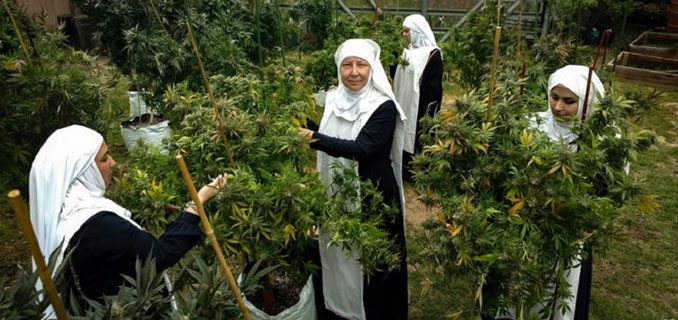
The transformation of cannabis culture from an illegal and socially disapproved-of activity to a multibillion-dollar mass marketed industry represents one of the largest social changes of this century. A distinctly odd film opening this week about some drug dealing “nuns” shines a light on the way it all unfolded.
Breaking Habits
To call Robert Ryan’s patchy doco on weed growing nun Christine Meeusenfled, now Sister Kate, “curious” is an understatement. It reveals more about the push for legalisation than it intends to, and although clearly being marketed to dope smokers and those progressive types hanging out for law reform, it doesn’t preach to the converted. Whatever your views on the drug are, they won’t be changed by this film. Which is a relief – the media doesn’t need any more thinly disguised advertorials for the ever expanding hemp and cannabis industry, yet another in the now continuous barrage of stories flooding our news and entertainment outlets. That battle is over – dope is mainstream – there’s even a medicinal cannabis plot line running on Home and Away.
And it’s been won by the people with the most money and influence – the corporate drug barons of Wall Street and their new agri-business subsidiaries. They’re the same lovely folk who market Zoloft and other anti-depressants, now used by one in eight adults and adolescents in the US, and incredibly – one in five white females. A few decades ago, they managed to convince doctors to prescribe opioids for people with sore backs and headaches. In the US now – with next to zero empirical evidence and absolutely no scientific testing, there are cannabis products freely available and widely advertised that will “help” pretty much all known modern ailments. Including (and this is no joke), the boredom of being a stay-at-home mum looking after small kids.
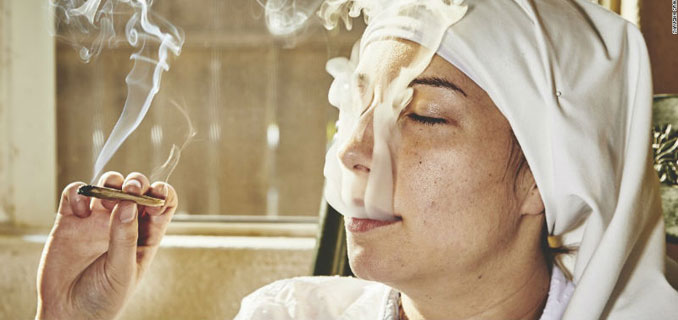
The first half of Breaking Habits focuses on Sister Kate’s intriguing backstory – her early life as corporate go-getter, marriage to a nice guy who just wanted to be a househusband and raise the kids, but who stole all her money and turned out to be a bigamist. Broke and homeless, she went to live with her brother in Merced in the central valley of California where she soon noticed the state’s medicinal cannabis laws offered an opportunity. She got into a small scale growing and distribution business with him, but they fell out in a violent dispute – the banal sort that drug dealers inevitably have over money. Back on the streets, she joined the Occupy movement, but ever the entrepreneur, decided instead to put on a nun’s habit, gather a group of like-minded ladies and start a new business, the “Sisters of the Valley”.
The nuns’ garb seems to be the extent of their spirituality – there’s no elaboration in the film at all on what this community actually believes in or how it works. We do get some lively anecdotes of their encounters with machine-gun wielding drug gangs and an over-zealous local sheriff, a poor sap tasked with policing the State’s then ridiculous “six plants only” law. True, there is some mumbo-jumbo from a Native American medicine man and a mention of the order’s “sacred mission” of getting healing CBD products (not the more intoxicating THC ones) “to those most in need” – but only in passing. The rest of the time Sister Kate is spruiking “business growth and taxation opportunities” for the rural communities of California – where small farmers and local businesses are being severely impacted by drought and growth of agribusiness.
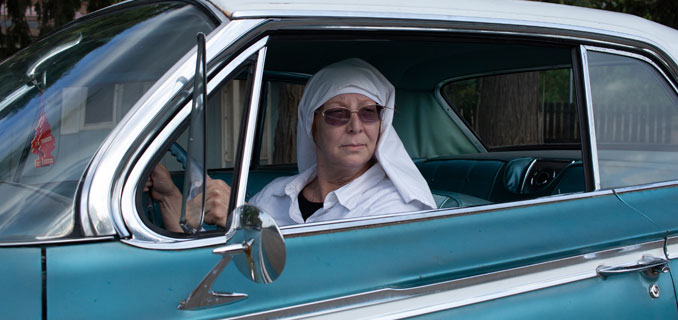
That’s a powerfully convincing message, and plenty of local chamber of commerce types, boardrooms, treasury bureaucrats, and legislators are listening – the world over.
Sister Kate’s son pops up early in the film in a haze of dope smoke telling us he “can’t believe it’s illegal” (before it wasn’t). Later he’s a full-blown meth junkie seemingly proving the gateway theory about drug progression – usually rubbished by dope’s evangelists. Luckily the profits of her trade more than paid for his rehab – and by the end of the film, he’s back in the business of keeping Californians stoned and stupid enough to make his mum rich. The climax of the film is a local court hearing giving the Sisters a permit to trade legally and expand their “$5 million a year” business. Though now as result of the state-wide Californian Yes vote, they’ll have plenty of competition.
Australia may be a decade or so behind California and Canada, but it will happen here too – no one really doubts that, do they? In decades hence, when we’re grappling with another devastating “addiction crisis” or whatever social malaise the media is then wringing its collective hands over, this is the sort of film we’ll be able look back on: A curious side bar in the grand story of how a multibillion dollar capitalist machine won. M from April 18. Local cinemas include Palace Norton St and Dendy Newtown. ★★★1/2
Breaking Habits competition
Thanks to everyone who entered our Breaking Habits competition, and nominated their “favourite drug dealer” from TV or a movie. There was a wide and varied response – not everyone honoured Breaking Bad’s Walter White (Bryan Cranston), though he was, as expected, the clear outright winner. “ NO brainer!! Walter White!!” exclaimed one. “Gotta be Walter White – Apply yourself Pinkman!” echoed another, though be fair – Jessie (Aaron Paul) did try his hardest – and that earned him a few nominations too. Tony Montano (Al Pacino) from Scarface came in a respectable second, with a lot of distance before housewife Nancy Botwin (Mary-Louise Parker) from Weeds, and then equal fourth-placed George Jung (Johnny Depp) from Blow and Atlanta’s Alfred “Paper Boi” Miles (Brian Tyree Henry). 90-year-old Clint Eastwood from The Mule also got several mentions, as did John Travolta from Pulp Fiction (below) – both oldies but goodies indeed.
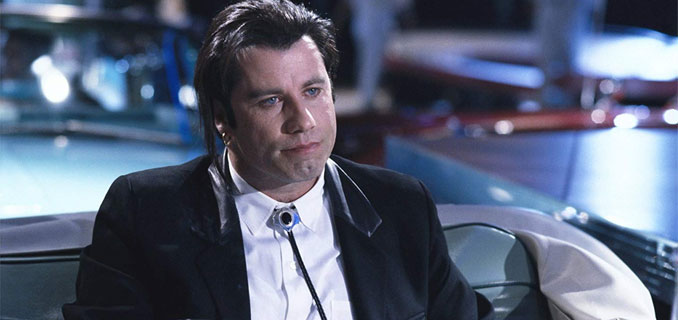
Overall the response from readers displayed both a wide knowledge and a deep and abiding interest in the colourful world of illegal drug dealing. Scriptwriters will be hoping our laws never change so much that our fictional antiheroes never have to become boring men in suits – reduced to settling their differences with debates in corporate boardrooms. Not a lot of drama in that…
It was a hard comp to judge, and I’ll confess that I chose two who picked my own personal favourites. So a “Breaking Habits” toke bag (I mean tote) and a double movie pass are heading to the entrants who nominated Stringer Bell (Idris Elba) from The Wire, and the nameless “The Guy” (Ben Sinclair) from High Maintenance (below left). Both charismatic and enigmatic men – but so very, very different…
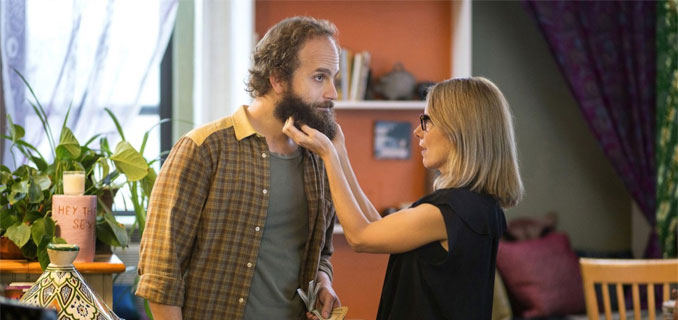
And for those entrants who didn’t bother answering the question (and there were about a dozen), well, what did you expect? You didn’t score anything.
Russell Edwards



